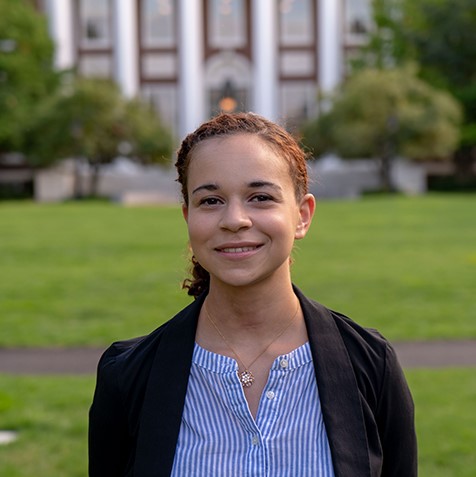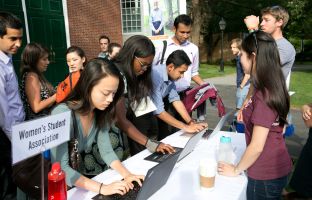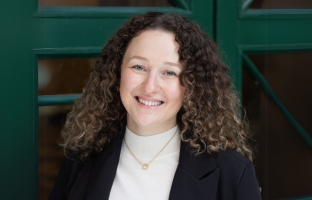In the fall of 2019, Kaelyn Griffin and Adam Palay entered HBS as two of 30 students in the MS/MBA: Engineering Sciences Program, a joint degree offered with the Harvard John A. Paulson School of Engineering & Applied Sciences. Designed to train future leaders of technology ventures, the MS/MBA curriculum provides a strong foundation in general management, builds students’ design skills, and extends their understanding of engineering.
Upon completion of the program, graduates are prepared to make decisions grounded in technical and strategic intelligence, which are the domain of successful product managers, general managers, startup founders, and CEOs of mature technology companies.
Blending technical skills and business management knowledge
 Like all students in the MS/MBA program, Kaelyn and Adam had backgrounds in computer science or engineering. Prior to HBS, Kaelyn, a chemical engineer, worked as process engineer at ArcelorMittal where her daily vocabulary included terms like ‘electrogalvanizing’ and ‘laser flatness’, while Adam, who holds an AB and MS in English and is a self-taught coder, worked in various software engineering roles at edX and Etsy.
Like all students in the MS/MBA program, Kaelyn and Adam had backgrounds in computer science or engineering. Prior to HBS, Kaelyn, a chemical engineer, worked as process engineer at ArcelorMittal where her daily vocabulary included terms like ‘electrogalvanizing’ and ‘laser flatness’, while Adam, who holds an AB and MS in English and is a self-taught coder, worked in various software engineering roles at edX and Etsy.
 Both viewed the MS/MBA program as an opportunity to make a career change. Adam felt it would supply the necessary venue to inform and test his specific career hypothesis. He explained, “I wanted to understand why we have climate change and what I can do to mitigate, particularly the technical interventions that entrepreneurs and investors are thinking about, along with the economics.” Kaelyn’s motivation was rooted in her desire to explore roles in tech that were outside of her comfort zone. “I came to HBS for the MS/MBA program because I knew I wanted to stay within tech – likely in hardware – but beyond that, my interests were extremely broad, especially when I considered different functions” she recalled.
Both viewed the MS/MBA program as an opportunity to make a career change. Adam felt it would supply the necessary venue to inform and test his specific career hypothesis. He explained, “I wanted to understand why we have climate change and what I can do to mitigate, particularly the technical interventions that entrepreneurs and investors are thinking about, along with the economics.” Kaelyn’s motivation was rooted in her desire to explore roles in tech that were outside of her comfort zone. “I came to HBS for the MS/MBA program because I knew I wanted to stay within tech – likely in hardware – but beyond that, my interests were extremely broad, especially when I considered different functions” she recalled.
Adam’s analytical aptitude coupled with his appetite for understanding climate change solutions resonated with Breakthrough Energy Ventures (BEV), a venture capital firm investing in innovative technologies to address climate change at scale, where he accepted a summer internship as a Portfolio Greenhouse Gas Impact Analysis Intern. Kaelyn refined her broad career interests after hearing a guest speaker in the MS/MBA seminar discuss their experience commercializing new technologies. “I knew then that’s what I wanted to pursue for the summer,” said Kaelyn, who accepted an internship in strategic finance at Nature’s Fynd, a startup that created a new alternative protein.
Adding value as a career switcher
The MS/MBA curriculum builds upon students’ existing technical skills and, through the MBA Program’s first-year required curriculum, adds knowledge in nearly every essential aspect of business, including finance, leadership, marketing, and operations. As a result, students are equipped to add significant value in their summer internship, even as a career switcher. Kaelyn and Adam highlighted a few of the ways they were able to apply their transferable skills and knowledge to add value at their internship employers.
An engineer’s skillset
Adam: BEV is a pretty technical place, which is necessary when you’re trying to understand the human, business and social implications of technical ideas. For the projects I worked, I had to make lots of Excel models to clearly distill complex information. I applied the same principals I used as a programmer to make the models clean and succinct so that the information would raise interesting questions.
Kaelyn: One of my projects was making a techno-economic analysis which combined process modeling, engineering design, and economic valuation. Constructing the financial component of this model required a deep understanding of Nature’s Fynd’s production process. My engineering background gave me the foundation to quickly get up to speed on the technical process and spend more time conducting research, understanding what would impact costs, and putting the pieces together.
Applying newfound business knowledge
Adam: Much of the first-year MBA required curriculum proved useful during my internship: Finance gave me the language to understand MPVs, discount rates, and CapEx; Business, Government & the International Economy helped me consider the regulatory and political elements of the market; and lessons from Strategy allowed me to better evaluate questions like, ‘just because you have a great technology, how do you know that a good business can be built around it?’
Kaelyn: The required curriculum gave me a broad groundwork that enabled me to ask the right questions during my internship. In particular, the case method enabled me to talk things through, ask the right questions, and consider options, rather than focusing on a single answer. Finance gave me a better understanding of costs (fixed, operating, startup, depreciation, etc.) and Marketing was beneficial for the marketing research I had to conduct.
Bandwidth, curiosity, and fresh perspective
Adam: My eagerness to learn and my curiosity for BEV’s work led me to raise an important new set of questions for the team to consider going forward, which I included in my final presentation. Supplying BEV with added bandwidth to tackle projects and offering my perspective was a privilege.
Kaelyn: I conducted detailed competitor analysis and researched production processes for similar products that Nature’s Fynd might compete against. As scope of the project evolved throughout the summer, the team added additional questions. I was motivated by their interest in my perspective and their confidence in my ability to deliver.







